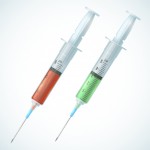
Keith Laws, Alex Langford and Samei Huda provide a critique of the British Psychological Society Division of Clinical Psychology report published today.
[read the full story...]
Keith Laws, Alex Langford and Samei Huda provide a critique of the British Psychological Society Division of Clinical Psychology report published today.
[read the full story...]
1 in 100 adults experience autism worldwide but little research exists on autism in adults. Adults with autism and learning disability may have distinct needs, and in particular challenging behaviour, which may increase their social isolation and reduce access to quality health care.
In her debut blog, Kate van Dooren looks at a systematic review from Canadian researchers who examined the evidence for the use of medications for challenging behaviours in adults with autism and learning disability.
[read the full story...]
Laurence Palfreyman summarises 3 recent Cochrane reviews, which investigate high-potency versus low-potency first-generation antipsychotic drugs for schizophrenia. The reviews find little difference in efficacy between the high-potency antipsychotics Trifluoperazine, Haloperidol, Fluphenazine, and low-potency typical antipsychotics.
[read the full story...]
André Tomlin summarises the second National Audit of Schizophrenia, which highlights that many people with schizophrenia are still not getting the high quality psychological and medical treatment they deserve.
[read the full story...]
As you know, we don’t normally blog about editorials on the Learning Disability Elf site, but this is on an important issue that affects a lot of people and we were keen to draw attention to the considered thoughts of the authors. We have posted many times in the past about the evidence base for [read the full story…]

A new study finds that psychiatric medications are implicated in many adverse drug events treated in US emergency departments. Nearly 1 in 10 of all adverse drug event visits to emergency departments are due to psychiatric drugs, including antidepressants, antipsychotics, lithium salts, sedatives, anxiolytics and stimulants.
[read the full story...]
Shared decision making is now commonplace, but will this approach ever be fully embraced in relation to antipsychotic prescribing? Liz Hughes reports on a recent qualitative study of consultant psychiatrists’ experiences that sheds some light on the issue.
[read the full story...]
Psychiatrist Andrés Fonseca considers how his clinical practice should change, after reading a systematic review and meta-analysis of drug treatment for neuropsychiatric symptoms in Alzheimer’s disease
[read the full story...]
John Baker reports on the first population based report of the positive effects of antipsychotic medication and mood stabilisers on reducing the risk of a conviction for violent crime, published in the Lancet in May.
[read the full story...]
Alex Langford summarises a relatively large and pragmatic study, which provides firm evidence that the newer antipsychotic, Paliperidone, is no better at preventing relapse or controlling psychotic symptoms than its decades-old comparator, Haloperidol.
[read the full story...]